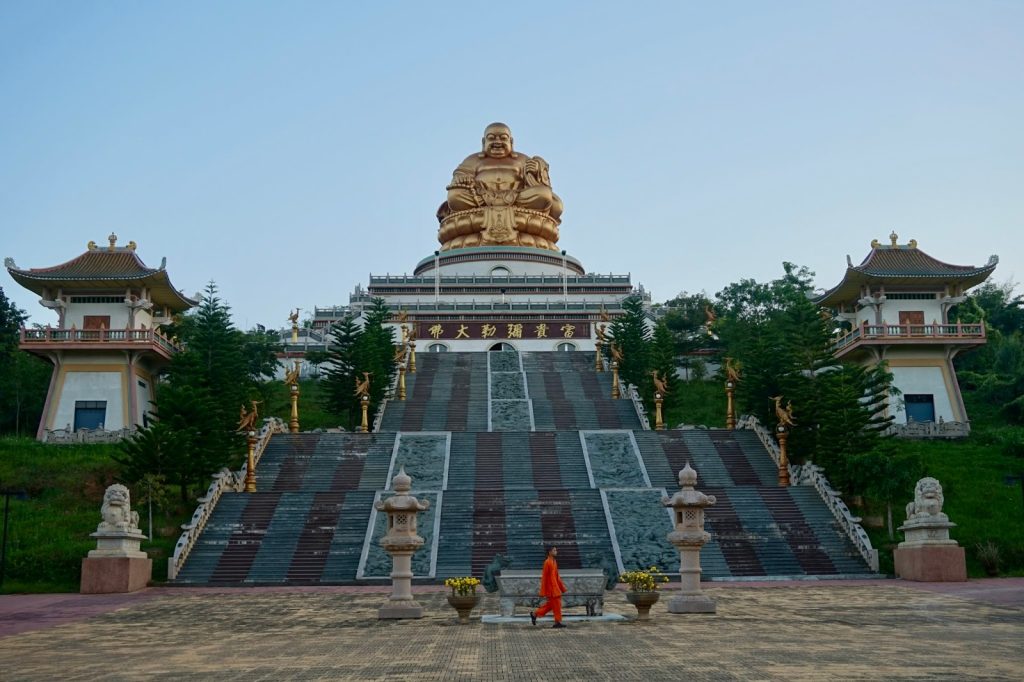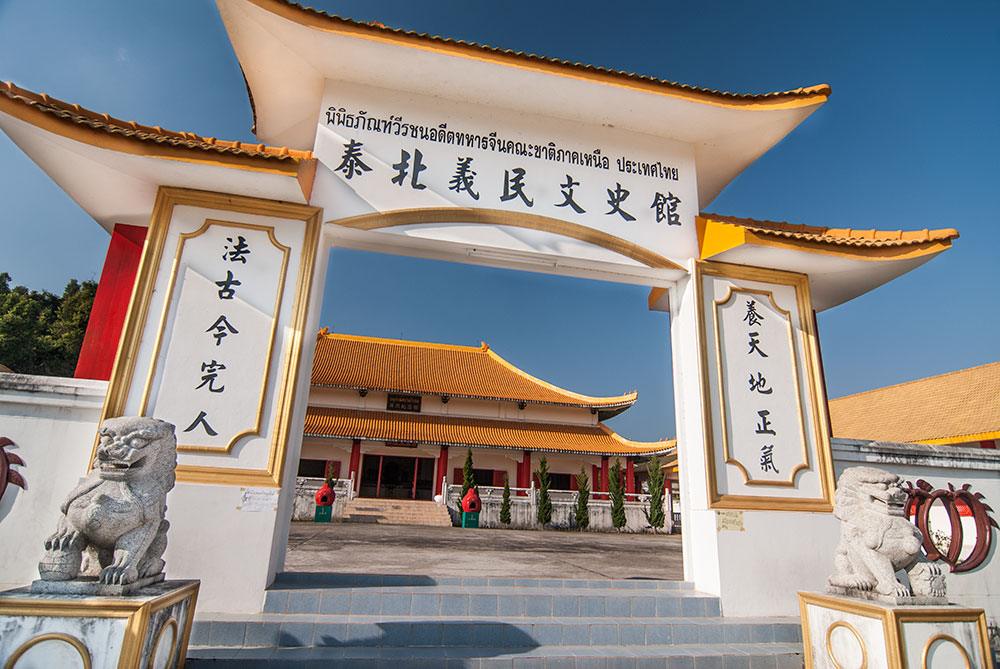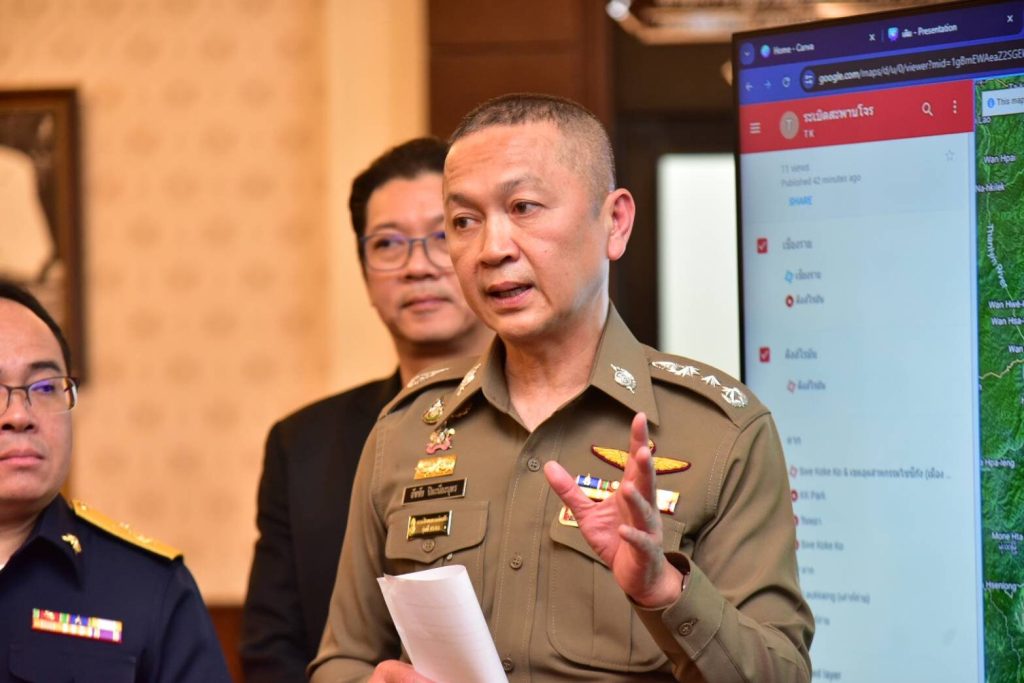Chiang Rai News
Unveiling the Cultural Threads Between Chiang Rai Thailand and China

Chiang Rai, a charming province in northern Thailand, with a rich tapestry of cultural connections to China with profound historical roots. Recent events have highlighted the longstanding relationship between Chiang Rai and China. The first provincial-level sister city designation between Chiang Rai and Yunnan exemplifies this relationship, demonstrating a long-standing, cross-border bond.
The presence of Chinese communities, particularly those of Yunnanese heritage, in Chiang Rai’s diversified geography demonstrates cultural contact between the two countries. These cultural crossovers not only add to the region’s liveliness, but also demonstrate the long-standing legacy of shared traditions and customs between the two countries.
Exploring Chiang Rai reveals a world in which Thai ideas, culture, and spirituality coexist peacefully with Chinese influences, resulting in a unique cultural fusion that is both engaging and illuminating. As one explores into the cultural intricacies of Chiang Rai, the enormous impact of Chinese ancestry on the region’s identity becomes clear, providing a window into the centuries-old links that have created its cultural landscape.
The historical and cultural significance of Chiang Rai’s linkages with China provide an intriguing view into a world where traditions, beliefs, and practices weave together to form a seamless tapestry of shared heritage.
By delving into the many layers of cultural interchange between Chiang Rai and China, one can discover a world where the past and present intersect, demonstrating the critical function of cultural diplomacy in linking nations and encouraging mutual understanding.

Historical Background
Chiang Rai, Thailand, has a strong historical connection with China, notably the province of Yunnan. This relationship is not simply geographical, but also based in cultural exchanges that have affected both places over time.
Sister City Relationship
The sister city relationship between Chiang Rai and Yunnan, China, demonstrates their long-standing cultural ties. This collaboration goes beyond symbolic, playing an important role in building mutual understanding and cooperation. Both regions have benefited from this cooperation by exchanging customs, arts, and ideals, enhancing each other’s cultural tapestry.
Influence of Chinese Culture
Chiang Rai’s habits, traditions, and architecture bear witness to the everlasting influence of Chinese culture. Chinese architecture has left its mark on temples and buildings around Chiang Rai, with intricate designs and ornate structures indicative of Chinese heritage. Furthermore, Chinese events such as the Lunar New Year have become cherished traditions among locals, highlighting the region’s cultural blending.
The historical exchanges between Chiang Rai and China have not only affected the cultural landscapes of both regions, but have also resulted in a distinct blend of customs and practices that define their relationship. Chiang Rai continues to embrace its ties with China through shared history and continuous cultural exchanges, preserving a heritage of mutual respect.

Cultural Exchange
Cultural interchange is essential for building the link between Chiang Rai, Thailand, and China. Through a variety of programs and activities, both areas have actively shared traditions, values, and practices, building understanding and appreciation. Let’s look at two key features of this cultural exchange:
Christian Cultural Exchange
In a Chinese town situated in northern Thailand, Christian cultural interaction thrives, demonstrating China’s rich connectivity with Southeast Asia. Festivals honoring Christian traditions bring communities together, reflecting melodies of togetherness and common heritage. This interchange not only preserves cultural roots, but also emphasizes the harmonious blend of Chinese influences in Chiang Rai’s diverse cultural tapestry.
Buddhist Influence.
Buddhism is a cornerstone in bridging the cultural divide between Chiang Rai and China, working as a unifying influence across boundaries. The tranquil air of Buddhist temples whispers stories of historic relationships, where rites and practices intersect, forming a spiritual bridge between the two regions. The echoes of Buddhist chanting travel through time, representing a deep connection that transcends geographical borders and fosters mutual understanding.
Through lively festivals, engaging art exhibitions, and innovative educational programs, Chiang Rai and China continue to weave a cultural tapestry of shared experiences and mutual respect. These cultural exchanges demonstrate the ongoing linkages that connect these regions, enhancing both populations with a greater awareness for each other’s past and traditions.
Current Cultural Landscape
Chiang Rai, a province in northern Thailand, has a dynamic cultural environment that is strongly entwined with its Chinese heritage. This dynamic blending of traditions and influences generates a distinct tapestry of diversity that distinguishes Chiang Rai as it exists today.

Chinese Population in Chiang Rai
The presence of Chinese people, particularly those of Yunnanese heritage, in the villages around Chiang Rai Province demonstrates the long-standing cultural connection between China and Thailand. These communities have brought their rituals, language, and culinary history, enriching the local culture with a diverse set of traditions. Chinese New Year, Dragon Boat Festival, and Qingming Festival are all widely celebrated, giving energy to Chiang Rai’s cultural calendar.
Chiang Rai’s Cultural Landscape with China
Thailand has a large overseas population from China, which has had a considerable impact on Chiang Rai’s cultural landscape. With strong historical and familial ties to China, these communities have passed down their legacy over centuries, adding to the region’s cultural diversity and depth. The merging of Thai and Chinese habits, beliefs, and art forms results in a happy coexistence that is visible in Chiang Rai’s daily life.
Contemporary activities and efforts that develop cultural ties between Chiang Rai and China act as a bridge across borders and promote mutual understanding. Cultural exchanges, art exhibitions, and educational initiatives continue to strengthen the bond between the two countries, resulting in a seamless combination of traditions and modern influences that define Chiang Rai’s current cultural scene.
Conclusion
The long-standing cultural linkages between Chiang Rai, Thailand, and China reflect the rich tapestry of cross-cultural contacts that have shaped both regions throughout the millennia. From the first provincial-level sister towns between China and Thailand to the presence of Chinese heritage in the villages around Chiang Rai, the linkages are deep and continue to enrich both regions’ legacy and identity.
These cultural exchanges not only highlight the historical connections between Chiang Rai and China, but also emphasize the significance of conserving and enjoying varied customs. The blending of Thai and Chinese influences in places like Wat Phra Singh shows how such contacts have resulted in a harmonious fusion of beliefs and practices, creating a distinct cultural environment that appeals to both locals and visitors.
As we consider the significance of these cultural linkages, we are reminded of how powerful cross-cultural encounters can be in building mutual understanding and appreciation. By embracing and recognizing our shared heritage, we not only preserve the past, but also pave the path for a more interconnected and culturally dynamic future for Chiang Rai and China alike.
By Geoff Thomas

Chiang Rai News
Chiang Rai Man Kills Woman’s Infant Daughter When She Refuses His Sexual Advances

Police in Wiang Kaen District of Chiang Rai Province have arrested a 50 year old man after the threatened to rape a 20 year-old woman and the proceeded to murder her 2 and half month old baby.
Police with doctors from Wiang Kaen Hospital and the Chao Luang Wiang Kaen Welfare Association were summoned to the scene of the incident to a 2-story cement house, Village No. 2, Tha Kham Subdistrict, Wiang Kaen District of Chiang Rai
On arrival they found Ms. Chanikarn, age 20, in a state of distress crying uncontrollably beside her 2 and a half month baby girl (Linlada) that was dead on the floor.
After calming Ms. Chanikarn, the child’s mother, said that at approximately 2:30 p.m she was out to collect diapers that had been dried in front of the house, while her 2 and a half month old daughter was sleep on the ground floor of the house.
She said she was suddenly approached by a Mr. Lee, about 40 years old, who lived on the opposite side of the road. He came towards her and grabbed her arm and threatened her saying if she didn’t sleeping with him he will go and kill his daughter.
Miss Chanikan refused and ran away, then Mr. Lee then walked into the house and grabbed Ms. Linlada’s leg, smashing the child’s head against the cement floor of the house. The infant died immediately.
Mr. Lee then just walked away and returned to his own home, leaving Miss Chanikan and her dead baby.
When police went to Mr. Lee’s home he immediately confessed killing the infant and was taken to Wiang Kaen Police Station for further questioning. Under caution he told police that he was sexually attracted to Miss Chanikan‘s and when her husband leave for work he took the opportunity to approach her.
He said when he saw her husband leave he crossed that road and found Miss Chanikan in the yard alone, he then threatened her to sleep with him, saying he would kill her child if she didn’t have sex with him. However when she refused he flew into a fit of rage walked into her home and murdered he baby. He said he was out of control with rage.
After killing the infant he walk across the street to his home and waited for the police to arrive. The police have charged him with premeditated murder and attempted rape. He is being held without bail at the local remand center.
Meanwhile, Miss Chanikan and her family were preparing a religious burial ceremony for the child.
Other Chiang Rai News:
Machete Wielding Man Shot an Killed by Police in Chiang Rai
https://www.chiangraitimes.com/chiangrai-news/machete-wielding-man-shot-an-killed-by-police-in-chiang-rai/
Chiang Rai News
Police in Chiang Rai Launch Crackdown on Cyber Criminals in Golden Triangle

CHIANG RAI: Prime Minister Settha Thavisin has authorized the establishment of an emergency cyber center operated by the Royal Thai Police to combat transnational crimes committed by call center gangs along the Thai border in Chiang Rai province.
On July 19, Prime Minister Settha Thavisin directed the Center to combat information technology crimes. The Royal Thai Police (Royal Thai Police) will crack down on call center gangs in Myanmar, Laos, and along the border.
His directive comes as call center gangs ratchet up their scams to defraud people of their money, causing concern among Thais and jeopardizing the country’s economic and social stability.
Pol. Gen. Kittirat Panphet, Deputy Commander and Director of the Police Crime Suppression Division, Assigned Pol. Lt. Gen. Thatchai Pitanilabut, Assistant Commander-in-Chief of the Police/Deputy Director of the Police Crime Suppression Division, has launched the operation ‘Bombing the Thieves’ Bridge’ in collaboration with the CAT Office, G., mobile phone network operators AIS DTAC TRUE NT, and local security agencies to cut the mobile phone signal and WiFi internet that criminals illegally use to deceive Thai citizens.

Pol. Lt. Gen. Thatchai stated that they will begin pressing the first action of the ‘Explosion of Thieves’ Bridge’ in Chiang Rai Province toward the thieves’ base of operations in the Golden Triangle Special Economic Zone.
The territory surrounding King Roman in Laos. King Roman is now a full-service entertainment destination with an airport that welcomes travelers from Thailand, Laos, and Myanmar, he explained.
According to Pol. Lt. Gen. Thatchai, this operation will have no influence on honest people along the Thai border, and it will only target cyber criminals.
They will also increase the arrest and prosecution of unlawful service towers, such as SIM booths, which allow gangs register SIM cards to swindle the people. Dealing with criminal organizations of foreigners and Thais who band together to deceive and damage Thais.

The National Broadcasting and Telecommunications Commission (NBTC) suspended more than three million SIM cards on July 16 because the holders had not verified their identities with their mobile phone operators by the deadline, in accordance with the NBTC’s measures to combat alleged fraudsters’ mule accounts.
The names of the holders of 80 million mobile phone numbers used for mobile banking transactions did not match the names associated with the mobile banking accounts.
The NBTC would require mobile phone companies to authenticate SIM card holders and the names of their mobile banking accounts. The verification procedure is expected to be completed by the end of September this year.
In addition, the NBTC and Royal Thai Police have collaborated to combat illegal telecom towers throughout the country’s borders, disconnecting signals at 465 places, altering antenna direction at 470 towers, and dismantling antennas at 179 locations.
They are certain that the move will disrupt contact center gangs and other types of technology-based crime.
Other Chiang Rai News:
Machete Wielding Man Shot an Killed by Police in Chiang Rai
https://www.chiangraitimes.com/chiangrai-news/machete-wielding-man-shot-an-killed-by-police-in-chiang-rai/
Chiang Rai News
Machete Wielding Man Shot an Killed by Police in Chiang Rai

Police in Mae Chan, Chiang Rai, shot and killed a 28-year-old man who allegedly attacked a police officer with a machete. The officer was slashed in the right leg with the machete.
According to police, the culprit, known only as Mr. Toon, had been harassing local villagers in Mae Chan district, Chiang Rai, threatening them with a knife and using violet insults.
The village headman arrived on the scene to try to calm Mr. Toon, but he was shouting hysterically and taking swipes at him with the machete, so he contacted the police.
When the responding officer arrived at the site about 9 p.m., he attempted to calm the man, but he instead assaulted the officer, slashing his right leg with the machete. In self-defense, the cop had to fire his gun at Mr. Toon, striking him in the chest.
Mr. Toon and the policeman were taken to Mae Chan Hospital, where Mr. Toon died of a gunshot wound. Pol Sgt. Sutthikiat Phanomphraisakul was released from the hospital after receiving numerous stitches for his injuries.
Local police received a tip around 9.30 p.m. yesterday that a guy was causing mayhem in the village. When authorities arrived, they discovered 28-year-old Toon strolling along a public road, holding a large knife and threatening people. Mae Chan district officials attempted to contain the incident.
During a search of Mr. Toon’s home, authorities discovered methamphetamine consumption equipment. Locals told authorities that the man was addicted to Yaba (Methamphetamine) and an alcoholic.
The authorities are conducting an inquiry to determine Toon’s motivations and whether any underlying issues contributed to his violent outburst.
Other related news:
Chiang Mai Police Offer Cash Reward After Officer Killed
https://www.chiangraitimes.com/crime/chiang-mai-police-offer-reward/
-

 News3 years ago
News3 years agoLet’s Know About Ultra High Net Worth Individual
-
Entertainment2 years ago
Mabelle Prior: The Voice of Hope, Resilience, and Diversity Inspiring Generations
-

 Health3 years ago
Health3 years agoHow Much Ivermectin Should You Take?
-

 Tech2 years ago
Tech2 years agoTop Forex Brokers of 2023: Reviews and Analysis for Successful Trading
-

 Lifestyles3 years ago
Lifestyles3 years agoAries Soulmate Signs
-

 Movies2 years ago
Movies2 years agoWhat Should I Do If Disney Plus Keeps Logging Me Out of TV?
-

 Health3 years ago
Health3 years agoCan I Buy Ivermectin Without A Prescription in the USA?
-

 Learning2 years ago
Learning2 years agoVirtual Numbers: What Are They For?











